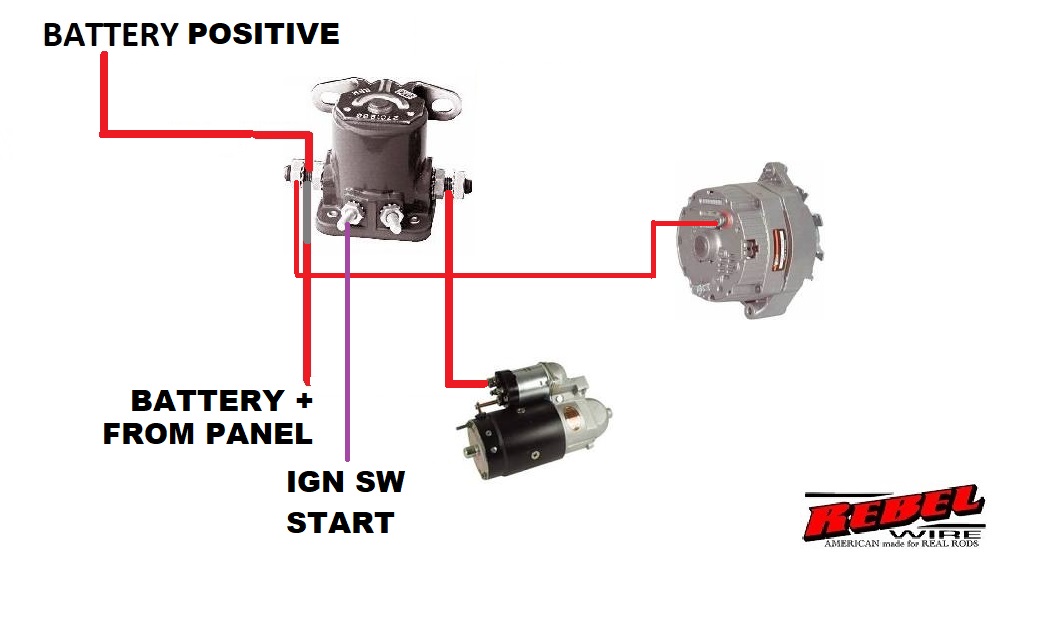Understanding Your Lawn Tractor Starter Solenoid Wiring
Starting your lawn tractor shouldn't feel like a wrestling match. A smooth start to your mowing session depends on a properly functioning starting system, and at the heart of this system lies the starter solenoid. Understanding the wiring for this crucial component can save you time, frustration, and potentially costly repairs.
Imagine turning your key, expecting the reassuring rumble of your lawn tractor's engine, but instead, you're met with silence. This frustrating scenario often points to an issue with the starting circuit, and a closer look at the starter solenoid wiring diagram might be the key to getting things running again. This diagram acts as a roadmap, illustrating the flow of power from the battery to the starter motor, passing through the solenoid.
The starter solenoid acts as a powerful relay, controlled by a small current from your ignition switch. When you turn the key, this small current activates the solenoid, which then closes a high-current circuit, sending power to the starter motor. This powerful burst of energy engages the starter, cranking the engine to life. Without a functioning solenoid and correct wiring, this process is interrupted, leaving you with a silent machine.
While the concept might sound complex, a lawn mower starter solenoid wiring schematic is relatively straightforward. Typically, it involves connections from the battery's positive terminal to the solenoid, from the solenoid to the starter motor, and a smaller wire connecting the solenoid to the ignition switch. Ground connections are also essential for completing the circuit. Variations exist depending on the specific make and model of your lawn tractor, highlighting the importance of consulting your tractor's manual for the precise diagram.
Tracing the path of electricity through the starter solenoid circuit clarifies its function. The battery provides the raw power, the ignition switch acts as the trigger, the solenoid serves as the high-current switch, and the starter motor is the muscle that turns the engine. A breakdown in any part of this chain, often due to loose connections, faulty components, or damaged wiring, will prevent the engine from starting.
The history of starter solenoids parallels the development of electric starters in automobiles. Early engines were started manually, often with a hand crank, a process that could be strenuous and even dangerous. The advent of electric starters and the accompanying solenoid simplified the starting process, making it more convenient and safe.
A simple example is observing the clicking sound you sometimes hear when turning the key. This often indicates a failing solenoid that's unable to close the high-current circuit. Using a voltmeter can help diagnose this issue by checking for voltage at different points in the circuit.
One benefit of understanding your tractor's starter solenoid wiring is the ability to troubleshoot starting issues yourself. With a wiring diagram and some basic tools, you can often identify and fix the problem, saving on repair costs. Another benefit is the ability to perform preventative maintenance. Regularly inspecting the wiring for loose connections, corrosion, or damage can prevent future starting problems. Lastly, understanding this system empowers you to make informed decisions about repairs and replacements, ensuring you choose the correct parts and avoid unnecessary expenses.
Advantages and Disadvantages of Understanding Starter Solenoid Wiring
| Advantages | Disadvantages |
|---|---|
| Troubleshooting capabilities | Potential for incorrect diagnosis |
| Cost savings on repairs | Risk of electrical shock if precautions aren't taken |
| Preventative maintenance opportunities | Time investment in learning and troubleshooting |
Best practices include disconnecting the battery before working on any electrical components, using the correct gauge wire for repairs, and securing all connections properly. Always consult your tractor's specific wiring diagram for guidance.
Frequently asked questions often revolve around identifying the location of the solenoid, testing the solenoid with a multimeter, and common causes of solenoid failure. Understanding the wiring diagram is key to answering these questions.
In conclusion, understanding the lawn tractor starter solenoid wiring diagram isn't just for mechanics. It's a valuable piece of knowledge for any tractor owner. By familiarizing yourself with this system, you'll be empowered to troubleshoot problems, perform preventative maintenance, and keep your tractor running smoothly. The ability to diagnose and fix starting issues not only saves you time and money but also provides a sense of accomplishment and self-reliance. Start by locating your tractor's manual, study the wiring diagram, and take the time to understand this essential component of your mowing machine. It's an investment that will pay off in the long run.
Dreamy master bathroom designs ideas
Decoding callie jacob the actress behind the fosters breakout star
Unlocking anine bing style your uk stockist guide













